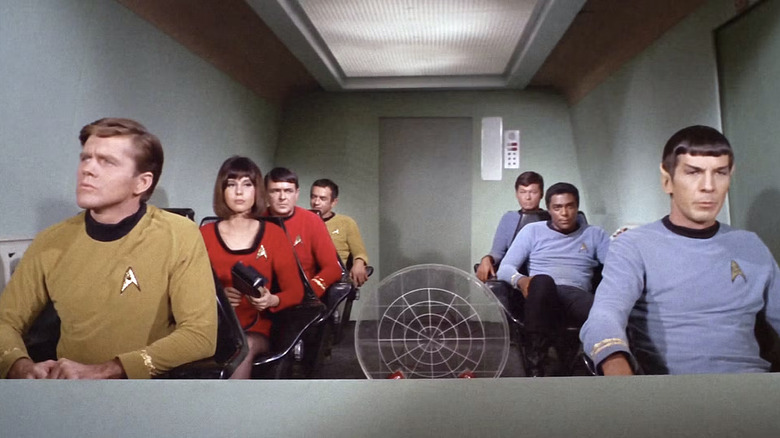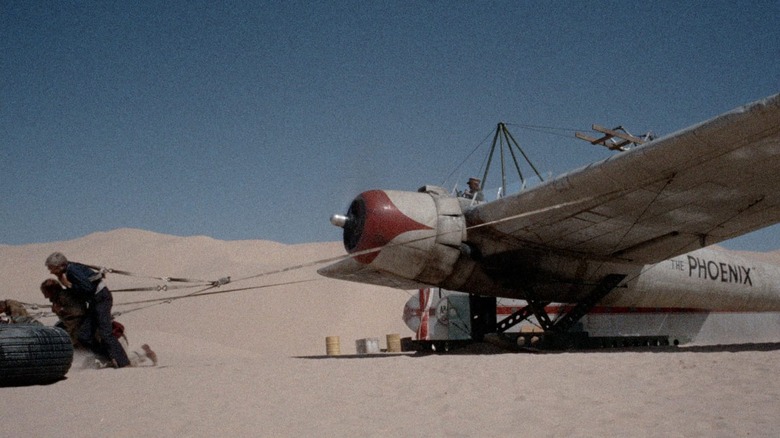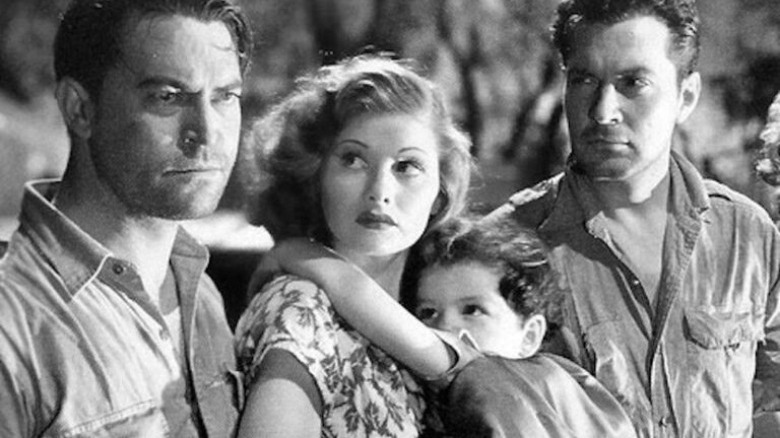Star Trek's The Galileo Seven Was A 'Rip-Off' Of A Forgotten Lucille Ball Film
In the "Star Trek" episode "The Galileo Seven" (January 5, 1967), Spock (Leonard Nimoy), Dr. McCoy (DeForest Kelley), Lieutenant Commander Scott (James Doohan), and three specialists are assigned to take Enterprise's shuttlecraft, the Galileo, on a special survey to map the Murasaki-312 quasar. A mysterious spatial phenomenon pulls the shuttle off course, however, and it crash lands on a nearby world inhabited by vicious 10-foot-tall cavemen.
The seven people on board the Galileo have to repair their ship and find a way to contact the Enterprise through the signal-scrambling mists of the quasar. Their job is made more difficult by the attacking cavemen, who want to murder them with spears. The collected and logical Spock attempts to scare off the brutes, while his more emotional, human counterparts encourage deadly force. When two of the Galileo Seven are killed, Spock discourages a memorial service. The episode is ultimately about how Spock's logic isn't always a practical tool when it comes to desperate command situations. Spock, we see, wouldn't necessarily be a good captain. At least not until he learns more about leading by instinct and intuiting what his crew requires of him.
Meanwhile, back on the Enterprise, Kirk (William Shatner) wants to search for the downed Galileo but is discouraged by an uffish dignitary named Ferris (John Crawford).
The teleplay for "The Galileo Seven" was written by Oliver Crawford and S. Bar-Davis, and it was based on an obscure 1939 feature film that few remember to this day. It's explained in the oral history book "Captains' Logs: The Unauthorized Complete Trek Voyages," edited by Mark A. Altman and Edward Gross that the writers were inspired by "Five Came Back," a plane crash melodrama directed by John Farrow and co-written by Dalton Trumbo.
But first, The Flight of the Phoenix
In "Captains' Logs," longtime Trek writer David Gerrold points out that, for its first 10 episodes, "Star Trek" was still finding its footing and establishing an identity. As such, none of the writers had yet given the show its own voice and had to rely on borrowed plots from recent hit films. Gerrold noted that "The Galileo Seven" was at least partially taken from a 1965 Robert Aldrich film. He said:
"If you look at the episodes that Roddenberry was responsible for in the beginning, [...] which was pretty much like the first 10 episodes, there's not a lot of [...] noble purpose there. There's bumbling around trying to find out what the show is about [...]. Because no one knew what 'Star Trek' was, they were continually inventing it. [...] They also a lot of rip-offs — 'The Galileo Seven' was 'Flight of the Phoenix,' 'Balance of Terror' was 'The Enemy Below' — and so they didn't really know what they could do with the show yet."
"The Enemy Below" was, of course, a 1957 World War II submarine film with Robert Mitchum. Transpose submarine action into space, and you have "Balance of Terror."
Aldritch's "The Flight of the Phoenix," meanwhile, was about an airplane that crashed in the Sahara, and the crew that had to survive the heat and get the plane working again. It was remade in 2004. One can see the blueprint of "The Galileo Seven" in "The Flight of the Phoenix."
Screenwriter Oliver Crawford, however, admitted that "Galileo" was a direct ripoff of "Five Came Back," a film that predates "Phoenix" by 16 years.
It was actually inspired by 'Five Came Back'
"Five Came Back" is about a plane that, while en route from Los Angeles to Panama City, is blown far, far off course. It crashes somewhere in northern Brazil, and the passengers have to learn to survive. A lot of personal confessions begin to flow out of the terrified travelers. Lucille Ball plays a character named Peggy, a woman with a mysterious past. Chester Morgan and John Carradine also appear. Crawford admitted to being a fan of "Five Came Back," and deliberately used the film as the basis of "The Galileo Seven." Crawford said:
"Most of my approach as a writer had been to look at old movies and say, 'Gee, this would make a good "Star Trek" or a good western or a good detective story.' The foundation for 'The Galileo Seven' was actually an old motion picture called 'Five Came Back.' That was about a plane crash in the Andes and the survivors who have to deal with headhunters over the next hill. I remembered it because it was such a dramatic gimmick, a very tight one."
"Five Came Back" is more of a traditional Hollywood melodrama, while "The Galileo Seven" was more action-forward and survival-focused. That might have been the result of Crawford's co-screenwriter Shimon Wincelberg, credited as S. Bar David, who was called in to re-write the script independently.
"The Galileo Seven" is, as Gerrold noted, classic "Star Trek" in that it doesn't quite feel like the heady, more sci-fi-oriented series that "Star Trek" would eventually become.


